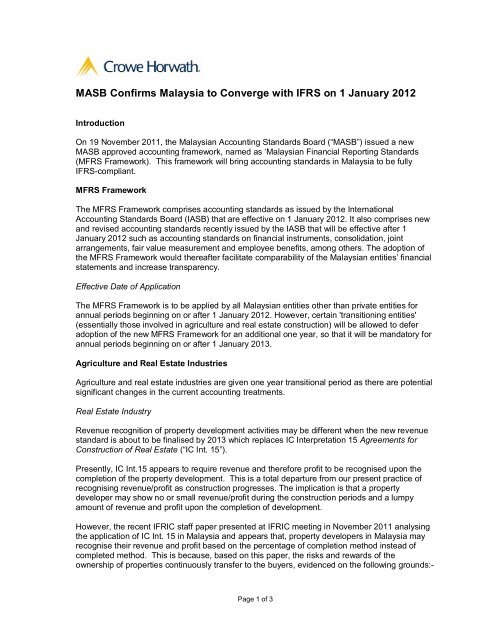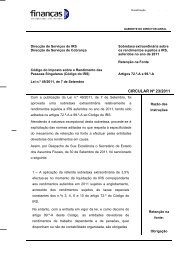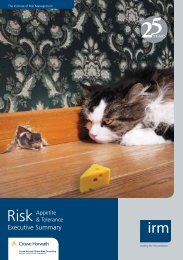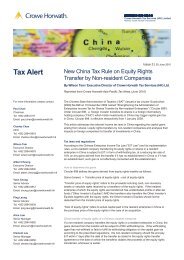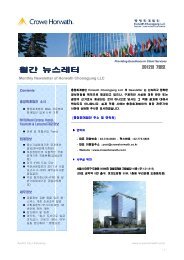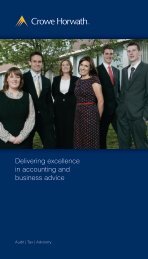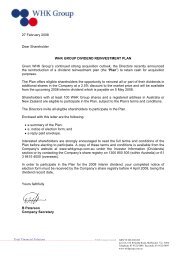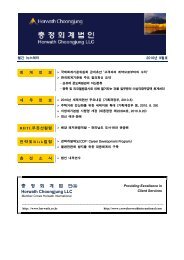MASB Confirms Malaysia to Converge with IFRS on 1 January 2012
MASB Confirms Malaysia to Converge with IFRS on 1 January 2012
MASB Confirms Malaysia to Converge with IFRS on 1 January 2012
You also want an ePaper? Increase the reach of your titles
YUMPU automatically turns print PDFs into web optimized ePapers that Google loves.
<str<strong>on</strong>g>MASB</str<strong>on</strong>g> <str<strong>on</strong>g>C<strong>on</strong>firms</str<strong>on</strong>g> <str<strong>on</strong>g>Malaysia</str<strong>on</strong>g> <str<strong>on</strong>g>to</str<strong>on</strong>g> <str<strong>on</strong>g>C<strong>on</strong>verge</str<strong>on</strong>g> <str<strong>on</strong>g>with</str<strong>on</strong>g> <str<strong>on</strong>g>IFRS</str<strong>on</strong>g> <strong>on</strong> 1 <strong>January</strong> <strong>2012</strong><br />
Introducti<strong>on</strong><br />
On 19 November 2011, the <str<strong>on</strong>g>Malaysia</str<strong>on</strong>g>n Accounting Standards Board (“<str<strong>on</strong>g>MASB</str<strong>on</strong>g>”) issued a new<br />
<str<strong>on</strong>g>MASB</str<strong>on</strong>g> approved accounting framework, named as ‘<str<strong>on</strong>g>Malaysia</str<strong>on</strong>g>n Financial Reporting Standards<br />
(MFRS Framework). This framework will bring accounting standards in <str<strong>on</strong>g>Malaysia</str<strong>on</strong>g> <str<strong>on</strong>g>to</str<strong>on</strong>g> be fully<br />
<str<strong>on</strong>g>IFRS</str<strong>on</strong>g>-compliant.<br />
MFRS Framework<br />
The MFRS Framework comprises accounting standards as issued by the Internati<strong>on</strong>al<br />
Accounting Standards Board (IASB) that are effective <strong>on</strong> 1 <strong>January</strong> <strong>2012</strong>. It also comprises new<br />
and revised accounting standards recently issued by the IASB that will be effective after 1<br />
<strong>January</strong> <strong>2012</strong> such as accounting standards <strong>on</strong> financial instruments, c<strong>on</strong>solidati<strong>on</strong>, joint<br />
arrangements, fair value measurement and employee benefits, am<strong>on</strong>g others. The adopti<strong>on</strong> of<br />
the MFRS Framework would thereafter facilitate comparability of the <str<strong>on</strong>g>Malaysia</str<strong>on</strong>g>n entities’ financial<br />
statements and increase transparency.<br />
Effective Date of Applicati<strong>on</strong><br />
The MFRS Framework is <str<strong>on</strong>g>to</str<strong>on</strong>g> be applied by all <str<strong>on</strong>g>Malaysia</str<strong>on</strong>g>n entities other than private entities for<br />
annual periods beginning <strong>on</strong> or after 1 <strong>January</strong> <strong>2012</strong>. However, certain 'transiti<strong>on</strong>ing entities'<br />
(essentially those involved in agriculture and real estate c<strong>on</strong>structi<strong>on</strong>) will be allowed <str<strong>on</strong>g>to</str<strong>on</strong>g> defer<br />
adopti<strong>on</strong> of the new MFRS Framework for an additi<strong>on</strong>al <strong>on</strong>e year, so that it will be manda<str<strong>on</strong>g>to</str<strong>on</strong>g>ry for<br />
annual periods beginning <strong>on</strong> or after 1 <strong>January</strong> 2013.<br />
Agriculture and Real Estate Industries<br />
Agriculture and real estate industries are given <strong>on</strong>e year transiti<strong>on</strong>al period as there are potential<br />
significant changes in the current accounting treatments.<br />
Real Estate Industry<br />
Revenue recogniti<strong>on</strong> of property development activities may be different when the new revenue<br />
standard is about <str<strong>on</strong>g>to</str<strong>on</strong>g> be finalised by 2013 which replaces IC Interpretati<strong>on</strong> 15 Agreements for<br />
C<strong>on</strong>structi<strong>on</strong> of Real Estate (“IC Int. 15”).<br />
Presently, IC Int.15 appears <str<strong>on</strong>g>to</str<strong>on</strong>g> require revenue and therefore profit <str<strong>on</strong>g>to</str<strong>on</strong>g> be recognised up<strong>on</strong> the<br />
completi<strong>on</strong> of the property development. This is a <str<strong>on</strong>g>to</str<strong>on</strong>g>tal departure from our present practice of<br />
recognising revenue/profit as c<strong>on</strong>structi<strong>on</strong> progresses. The implicati<strong>on</strong> is that a property<br />
developer may show no or small revenue/profit during the c<strong>on</strong>structi<strong>on</strong> periods and a lumpy<br />
amount of revenue and profit up<strong>on</strong> the completi<strong>on</strong> of development.<br />
However, the recent IFRIC staff paper presented at IFRIC meeting in November 2011 analysing<br />
the applicati<strong>on</strong> of IC Int. 15 in <str<strong>on</strong>g>Malaysia</str<strong>on</strong>g> and appears that, property developers in <str<strong>on</strong>g>Malaysia</str<strong>on</strong>g> may<br />
recognise their revenue and profit based <strong>on</strong> the percentage of completi<strong>on</strong> method instead of<br />
completed method. This is because, based <strong>on</strong> this paper, the risks and rewards of the<br />
ownership of properties c<strong>on</strong>tinuously transfer <str<strong>on</strong>g>to</str<strong>on</strong>g> the buyers, evidenced <strong>on</strong> the following grounds:-<br />
Page 1 of 3
Up<strong>on</strong> the executi<strong>on</strong> of the sales agreement, a buyer acquires the right <str<strong>on</strong>g>to</str<strong>on</strong>g> borrow m<strong>on</strong>ey<br />
against the work-in-progress when financier’s undertaking (“FU”) is signed.<br />
At the same time, the developer loses its right <str<strong>on</strong>g>to</str<strong>on</strong>g> borrow against the asset. Once the FU<br />
is signed, any existing charges over the properties must be discharged. The developer is<br />
prohibited thereafter from mortgaging the land and the developer’s lender must disclaim<br />
any rights <str<strong>on</strong>g>to</str<strong>on</strong>g> the land or development.<br />
Risk of n<strong>on</strong>-completi<strong>on</strong> by the developers is rest <str<strong>on</strong>g>with</str<strong>on</strong>g> the buyers as the buyers pay<br />
c<strong>on</strong>tinuously when the c<strong>on</strong>structi<strong>on</strong> is in progress.<br />
These m<strong>on</strong>ies are paid in<str<strong>on</strong>g>to</str<strong>on</strong>g> a separate bank account and are under the supervisi<strong>on</strong> of the<br />
regula<str<strong>on</strong>g>to</str<strong>on</strong>g>r. N<strong>on</strong>e of these payments are refundable.<br />
In additi<strong>on</strong> <str<strong>on</strong>g>to</str<strong>on</strong>g> the above, the buyers receive a number of rights <str<strong>on</strong>g>to</str<strong>on</strong>g> protect them from the risk of<br />
n<strong>on</strong>-completi<strong>on</strong> by the developers:-<br />
(a) developers are regulated.<br />
(b) c<strong>on</strong>tract terms are standardised by statute<br />
(c) if the developer fails <str<strong>on</strong>g>to</str<strong>on</strong>g> fulfill their obligati<strong>on</strong>s <str<strong>on</strong>g>to</str<strong>on</strong>g> the buyer the regula<str<strong>on</strong>g>to</str<strong>on</strong>g>r has a wide range<br />
of powers under the Act, including the ability <str<strong>on</strong>g>to</str<strong>on</strong>g> appoint another developer.<br />
The reas<strong>on</strong>s elaborated above and the protecti<strong>on</strong>s accorded <str<strong>on</strong>g>to</str<strong>on</strong>g> house buyers signify that<br />
significant risks have transferred <str<strong>on</strong>g>to</str<strong>on</strong>g> the house buyers. Accordingly, revenue and profit will be<br />
recognised progressively by a property developer, which is the present practice of the industry.<br />
However, this staff paper is still subject <str<strong>on</strong>g>to</str<strong>on</strong>g> the approval of the IASB Board. If such view is<br />
acceptable by the Board, there will be no/minimal financial impacts <strong>on</strong> the adopti<strong>on</strong> of the IC Int.<br />
15 by our local real estate players.<br />
Nevertheless, there are numerous other fac<str<strong>on</strong>g>to</str<strong>on</strong>g>rs that may influence the way revenue and profit of<br />
a property development project can be recognised. Therefore careful assessment <strong>on</strong> the sale<br />
agreements and the development arrangements should be made <strong>on</strong> each property development<br />
project <str<strong>on</strong>g>to</str<strong>on</strong>g> determine if transfer of risk and rewards of ownership of the properties <str<strong>on</strong>g>to</str<strong>on</strong>g> the house<br />
buyers has taken place.<br />
Agriculture Industry<br />
<str<strong>on</strong>g>MASB</str<strong>on</strong>g> <str<strong>on</strong>g>to</str<strong>on</strong>g>gether <str<strong>on</strong>g>with</str<strong>on</strong>g> several other standard setters of other jurisdicti<strong>on</strong>s are currently proposing<br />
<str<strong>on</strong>g>to</str<strong>on</strong>g> IASB <str<strong>on</strong>g>to</str<strong>on</strong>g> amend IAS 41 <strong>on</strong> accounting for bearer biological assets (e.g. plantati<strong>on</strong> trees) using<br />
IAS 16 property, plant and equipment c<strong>on</strong>cept instead of fair value <strong>on</strong>the bearer biological assets.<br />
In view of the pending changes <strong>on</strong> the revised accounting standard, <str<strong>on</strong>g>MASB</str<strong>on</strong>g> felt that a <strong>on</strong>e year<br />
transiti<strong>on</strong> arrangement should be given <str<strong>on</strong>g>to</str<strong>on</strong>g> this industry until IASB’s directi<strong>on</strong> is clearer.<br />
However, <strong>on</strong>e may view that this change in the fundamental accounting c<strong>on</strong>cept will not be<br />
completed in just <strong>on</strong>e year time. It may take a l<strong>on</strong>ger time for IASB <str<strong>on</strong>g>to</str<strong>on</strong>g> revisit IAS 41 as there are<br />
further issues which may need <str<strong>on</strong>g>to</str<strong>on</strong>g> be addressed for e.g. how <str<strong>on</strong>g>to</str<strong>on</strong>g> define a biological asset which<br />
c<strong>on</strong>tains both characteristic of bearer and c<strong>on</strong>sumable in nature (e.g. dairy cow or beef cow). In<br />
short, more changes are <str<strong>on</strong>g>to</str<strong>on</strong>g> be made <str<strong>on</strong>g>to</str<strong>on</strong>g> the revised IAS 41 before its issuance.<br />
Page 2 of 3
Benefits of Accounting <str<strong>on</strong>g>C<strong>on</strong>verge</str<strong>on</strong>g>nce<br />
Not<str<strong>on</strong>g>with</str<strong>on</strong>g>standing the issues that are found <strong>on</strong> the new standards such as those highlighted above<br />
in respect of the real estate and agriculture industries, the c<strong>on</strong>vergence is imminent, especially<br />
<str<strong>on</strong>g>with</str<strong>on</strong>g> other countries in this regi<strong>on</strong> which are moving ahead <str<strong>on</strong>g>with</str<strong>on</strong>g> the c<strong>on</strong>vergence. We should also<br />
take cognisance of benefits of c<strong>on</strong>vergence; such as:-<br />
Reduce reporting costs for cross-border reporting<br />
Increased reporting c<strong>on</strong>sistency and provide high quality financial reporting<br />
Increased credibility of local markets in the eyes of the foreign inves<str<strong>on</strong>g>to</str<strong>on</strong>g>rs<br />
Encourage cross-border listing and development of capital markets<br />
Increase mobility of accountants<br />
FRS Framework<br />
To be c<strong>on</strong>sistent <str<strong>on</strong>g>with</str<strong>on</strong>g> the issuance of MFRS Framework, several new and revised accounting<br />
standards <strong>on</strong> FRS Framework have also been developed, namely FRS 9 Financial Instruments,<br />
FRS 10 C<strong>on</strong>solidated Financial Statements, FRS 11 Joint Arrangements, FRS 12 Disclosure of<br />
Interests in Other Entities, FRS 13 Fair Value Measurement, FRS 119 Employee Benefits, FRS<br />
127 Separate Financial Statements, and FRS 128 Investments in Associates and Joint Ventures,<br />
four limited amendments <str<strong>on</strong>g>to</str<strong>on</strong>g> FRSs (FRS 1, FRS 7, FRS 101 & FRS 112) and IC Int. 20<br />
Extinguishing Financial Liabilities <str<strong>on</strong>g>with</str<strong>on</strong>g> Equity Instruments. Some of these pr<strong>on</strong>ouncements are<br />
effective <strong>on</strong> 1 <strong>January</strong> <strong>2012</strong> whilst others are later.<br />
The key differences between the FRS Framework and MFRS Framework are that in the former,<br />
(a) FRS <strong>2012</strong>004 Property Development Activities will c<strong>on</strong>tinue <str<strong>on</strong>g>to</str<strong>on</strong>g> be the extant standard for<br />
accounting for property development activities and not IC Int. 15, and (b) there is no equivalent<br />
standard <str<strong>on</strong>g>to</str<strong>on</strong>g> IAS 41.<br />
The <str<strong>on</strong>g>MASB</str<strong>on</strong>g> approved accounting standards can be downloaded at http://www.masb.org.my.<br />
Page 3 of 3


